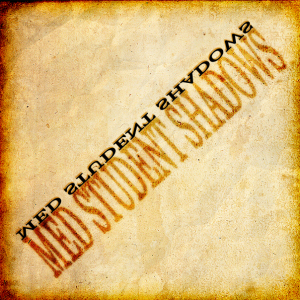 “If you start feeling lightheaded or faint,” the surgeon told me in the operating room, “just don’t fall into the patient. You can fall anywhere else. Just not into the patient.”
“If you start feeling lightheaded or faint,” the surgeon told me in the operating room, “just don’t fall into the patient. You can fall anywhere else. Just not into the patient.”
This was the first time I had ever shadowed a surgeon, and a dark cloud of fear started to cloak my feelings of excitement. I had never thought myself to be a queasy person, but suddenly I kept imagining myself plunging face-forward off of my stepstool and into the sterile field. How disastrous that would be… and how embarrassing.
I tiptoed on the stepstools, peering nervously over the attending’s back, vigilantly looking out for the first signs of lightheadedness. And as I watched with suspense the thoracic surgeon deftly wedge the patient’s ribs apart to reveal the lungs, I began to wonder if I could see myself as a doctor, doing the same.
—
When deciding what to write about for my first post in this column, I thought it made sense to start with my first shadowing experience in the OR. This took place during my sophomore year of college, and I was still a teenager—a wide-eyed, eager premed. I had decided in high school I wanted to be a doctor because I lost two dear family members to cancer within months of each other. Still, I wanted to shadow to make sure medicine was in my future. Shadowing is something all our premed advisors encourage us to do, to explore medicine and see if it really “right” for us.
And yes, shadowing is great for that. You get to follow a doctor around, see what they do, watch them work with patients, learn about the conditions they encounter, get to pester them with lots of questions. And indeed, my week of shadowing was a really important experience. After all, I got to watch a great surgeon (and teacher) work in the OR and in the clinic.
But if we shadow doctors to explore medicine, then why not explore other fields? My humble advice to any premeds who may be reading: take advantage of all the opportunities college (and maybe the world beyond) has to offer, soak up as much as you can, explore whatever strikes your curiosity. Study abroad if you can, take the classes or read the books you’ve always wanted to, devote time to the causes and initiatives about which you’re passionate, and if any of your classes make you curious about something, then email your professor and meet up with them—maybe even start investigating your question by doing research with them!
After enjoying a biological anthropology course in my freshman year, I decided spend the following summer tracing the contours of archeological bones as a research assistant in a functional anatomy lab (instead of waiting for cultures to grow or decapitating rats, as thrilling as those sound). I loved playing with kids and had a place in my heart for people with cancer, so I became a child life volunteer at a pediatric oncology outpatient clinic, where I tried to chat with reticent teens and helped little kids make bead necklaces and color pictures. Each semester, I passed on taking classes like virology and advanced organic chemistry lab so I could take one or two creative writing or history classes instead. I shifted my junior year schedule around so I could experience a semester abroad in Australia. My only regret? That I didn’t explore even more!
What is my point? Shadowing a doctor to learn whether medicine is right for you is only one—while important—piece of the puzzle. But you can learn so much about yourself by checking out everything else that intrigues you, too. I really felt that by experiencing worlds outside of medicine, I gained confidence to enter the medical world.
And for those premeds who are curious, I was asked most about these unique experiences during my interviews. On top of that, each and every one of my talented medical school classmates has had their own incredible stories of exploration—during college or years off, in this country or abroad, as an artist, athlete or entrepreneur! Each of our stories makes our medical school experience so much richer, and medical school admissions committees appreciate that. That’s why applicants hear the phrase “well-rounded” so much. Of course, applicants still need great numbers—but the experiences are what make certain people stand out. This is something I’ve been told is important for residency applications, too, and that’s probably a good thing.
—
As I stood on my tiptoes in the OR for the first time that summer afternoon, I grew mesmerized by the surgeon’s confident maneuvers, the patient’s pink, spongy lungs resting just beneath his ribs, the smoothly-operating teamwork in action—I loved it. That week, the first piece of my puzzle, added fuel to my dream of pursuing medicine. But that week alone wasn’t enough to drive my ultimate decision to do so. Nor was the following shadowing session. It wasn’t just one piece of the puzzle that cemented my decision, it was the whole picture—shadowing and all the other experiences I’d had came together and helped me say confidently, “Yes. I want to be a doctor.”
Although I will say, the fact that I didn’t faint in the OR that day… that helped, too.
As medical students, we shadow physicians to learn about the nature of medicine from them and their patients. In this column, Diem traces her own shadow, preserving and illustrating her experiences—in class, in the hospital, and in between—as a humble medical student.

